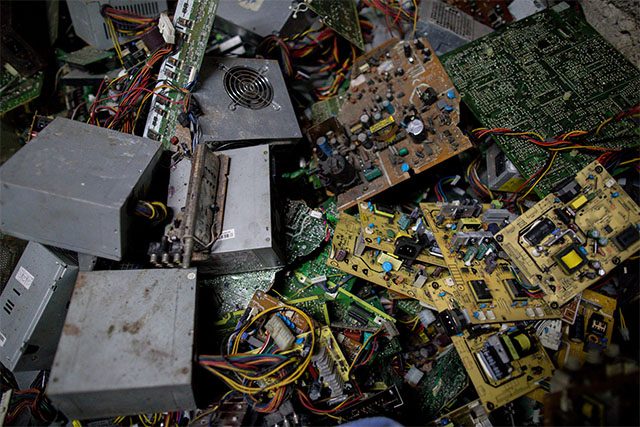
A waste and pollution watchdog group last week reiterated its call to ban the importation of electronic waste as amid the increasing demand for computer and gadget usage during the pandemic.
EcoWaste Coalition last year urged the Department of Environment and Natural Resources to prohibit the importation of wastes, including plastic and electronic, citing that it its still permitted by the agency under its administrative order 2013-22.
DENR A.O. 2013-22 allows the importation of “recyclable materials” such as scrap metals, scrap plastics, electronic assemblies and scrap, used oil and fly ash subject to certain limiting conditions and compliance to the requirements set by the Environmental Management Bureau (EMB).
EMB, which is currently reviewing and revising the said administrative order to update the requirements and address emerging issues, has drafted the “Guidelines on the Environmentally Sound Management of Waste Electrical and Electronic Equipment.”
However, the guidelines have yet to be officially released.
“The global surge in the production of e-waste is deeply concerning for developing countries like the Philippines that still allow the importation of electronic junks. End-of-life computers, TVs, mobile phones and other unwanted electrical and electronic equipment (EEE) from overseas might end up flooding our ports if no preventive action is taken,” Roxanne Figueroa, E-Waste Campaigner, EcoWaste Coalition said in a statement.
“As the demand for computers and other e-gadgets grows with their increased use in online activities amid the COVID-19 pandemic, we need to be extra vigilant against the potential rise in shipments of pre-owned electronics nearing or at the end of their useful lives, which can only add to our toxic waste woes,” she added.
In 2019, production of electronic waste globally increased to 53.6 million tonnes due to higher consumption rates of EEE, among other reasons, according to a newly-released United Nations’ Global E-waste Monitor 2020.
The global generation of e-waste, which is classified as hazardous waste under the Basel Convention due to the presence of brominated flame retardants, lead, mercury and other toxic substances, is projected to reach 74.7 million tonnes by 2030.
In the latest Global E-waste Monitor, it was said that “a considerable amount of e-waste is still exported illegally or under the guise of being for reuse or pretending to be scrap metal.”
“In middle- and low-income countries, the e-waste management infrastructure is not yet fully developed or, in some cases, is entirely absent. Hence, e-waste is managed mostly by the informal sector. In this case, e-waste is often handled under inferior conditions, causing severe health effects to workers as well as to the children who often live, work and play near e-waste management activities,” the report read.
In view of this, Maria Neira, director for Environment, Climate Change and Health Department of the World Health Organization (WHO) said that informal and improper e-waste is seen to become a major hazard in the health of future generations.
“One in four children are dying from avoidable environmental exposures. One in four children could be saved, if we take action to protect their health and ensure a safe environment,” Neira cited.
Thony Dizon, Chemical Safety Campaigner of the EcoWaste Coalition then said that the Philippines should stop the entry of e-waste and other waste to the country to protect the public health and the environment.
“We need to plug loopholes in regulation and ratify the Basel Ban Amendment, an international law prohibiting all hazardous waste exports from developed to developing countries,” he suggested.
Dizon said that such move “will encourage developed countries not to transfer their unwanted e-waste in the Philippines., as well as drive the electronic industry to shift to clean production and take full responsibility for the environmental impacts of their products throughout the product life-cycle, including their reuse, buyback or recycling.” —Rosette Adel









